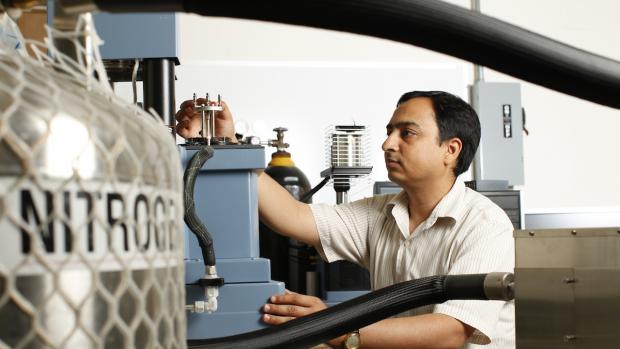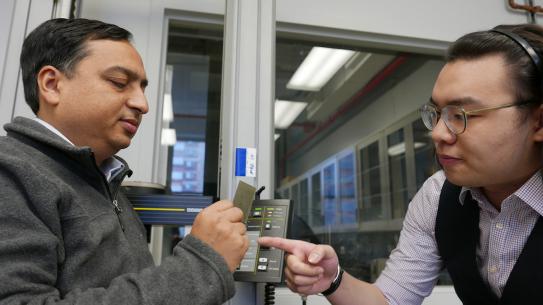Researchers Use Artificial Neural Networks To Streamline Materials Testing

Research by Nikhil Gupta, associate professor of mechanical and aerospace engineering promises to reduce the cost and boost the efficiency of materials testing by combining traditional dynamic mechanical analysis (DMA) with artificial neural networks.
BROOKLYN, New York, Monday, February 4, 2019 – Optimizing advanced composites for specific end uses can be costly and time-consuming, requiring manufacturers to test many samples to arrive at the best formulation. Investigators at the NYU Tandon School of Engineering have designed a machine learning system employing artificial neural networks (ANN) capable of extrapolating from data derived from just one sample, thereby quickly formulating and providing analytics on theoretical graphene-enhanced advanced composites.
The work, led by Nikhil Gupta, associate professor of mechanical and aerospace engineering at NYU Tandon, with Ph.D. student Xianbo Xu and collaborators at 2D graphene materials manufacturer GrapheneCa, is detailed in “Artificial Neural Network Approach to Predict the Elastic Modulus from Dynamic Mechanical Analysis Results,” which will be featured on the inside cover of the journal Advanced Theory and Simulations.
Tensile tests and dynamic mechanical analysis (DMA) are widely used to characterize the viscoelastic properties of materials at different loading rates and temperatures. But this requires an elaborate experimental campaign involving a large number of samples.
The Tandon team found a way to bypass this process by designing an ANN-based approach that builds a model and then feeds it data from DMA — a test of a material’s response to a given temperature and loading frequency (a measure of load applied in cycles) — to predict how it will respond to any other temperature and pressure combination. Gupta explained that ANN extrapolated from measures of samples’ ability to store and dissipate energy under different conditions.

“Testing materials under different conditions during the product development cycle is a major cost for manufacturers who are trying to create composites for numerous applications,” noted Gupta. “This system allows us to conduct one test and then predict the properties under other conditions. It therefore considerably reduces the amount of experimentation needed.”
“Applying an artificial neural network approach to predict the properties of nanocomposites can help in developing an approach where modeling can guide the material and application development and reduce the cost over time,” continued Gupta.
“Working with the researchers at NYU Tandon’s Department of Mechanical and Aerospace Engineering, we have developed a new method for predicting the behavior of thermosetting nanocomposites over a wide range of temperature and loading rates,” said Dr. Sergey Voskresensky, Head of Research & Development at GrapheneCa’s New York-based production facility. “Furthermore, the same approach can potentially be applied to predict a behavior of thermoplastic materials. This is a critical step towards advanced composite production.”
This research was supported by grants from the U.S. Office of Naval Research.
“Artificial Neural Network Approach to Predict the Elastic Modulus from Dynamic Mechanical Analysis Results,” is available at: onlinelibrary.wiley.com/doi/full/10.1002/adts.201800131
Note: Images available at https://nyutandon.photoshelter.com/galleries/C0000DKT3j1lAvpA/G0000KwTJYYJDBhk/AI-Stress-Test
About the New York University Tandon School of Engineering
The NYU Tandon School of Engineering dates to 1854, the founding date for both the New York University School of Civil Engineering and Architecture and the Brooklyn Collegiate and Polytechnic Institute (widely known as Brooklyn Poly). A January 2014 merger created a comprehensive school of education and research in engineering and applied sciences, rooted in a tradition of invention and entrepreneurship and dedicated to furthering technology in service to society. In addition to its main location in Brooklyn, NYU Tandon collaborates with other schools within NYU, one of the country’s foremost private research universities, and is closely connected to engineering programs at NYU Abu Dhabi and NYU Shanghai. It operates Future Labs focused on start-up businesses in downtown Manhattan and Brooklyn and an award-winning online graduate program. For more information, visit http://engineering.nyu.edu.




